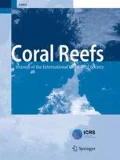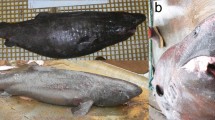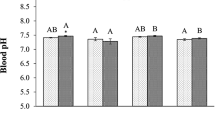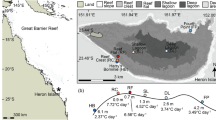Abstract
Anthropogenic ocean acidification (OA) is a threat to coral reef fishes, but few studies have investigated responses of high-trophic-level predators, including sharks. We tested the effects of 72-hr exposure to OA-relevant elevated partial pressures of carbon dioxide (pCO2) on oxygen uptake rates, acid–base status, and haematology of newborn tropical blacktip reef sharks (Carcharhinus melanopterus). Acute exposure to end-of-century pCO2 levels resulted in elevated haematocrit (i.e. stress or compensation of oxygen uptake rates) and blood lactate concentrations (i.e. prolonged recovery) in the newborns. Conversely, whole blood and mean corpuscular haemoglobin concentrations, blood pH, estimates of standard and maximum metabolic rates, and aerobic scope remained unaffected. Taken together, newborn blacktip reef sharks appear physiologically robust to end-of-century pCO2 levels, but less so than other, previously investigated, tropical carpet sharks. Our results suggest peak fluctuating pCO2 levels in coral reef lagoons could still physiologically affect newborn reef sharks, but studies assessing the effects of long-term exposure and in combination with other anthropogenic stressors are needed.


Similar content being viewed by others
References
Albright R, Langdon C, Anthony KRN (2013) Dynamics of seawater carbonate chemistry, production, and calcification of a coral reef flat, central Great Barrier Reef. Biogeosciences 10:6747–6758
Bouyoucos IA, Weideli OC, Planes S, Simpfendorfer CA, Rummer JL (2018) Dead tired: evaluating the physiological status and survival of neonatal reef sharks under stress. Conserv Physiol 6:coy053
Bouyoucos IA, Romain M, Azoulai L, Eustache K, Mourier J, Rummer JL, Planes S (2020) Home range of newborn blacktip reef sharks (Carcharhinus melanopterus), as estimated using mark-recapture and acoustic telemetry. Coral Reefs. https://doi.org/10.1007/s00338-020-01965-z
Di Santo V (2016) Intraspecific variation in physiological performance of a benthic elasmobranch challenged by ocean acidification and warming. J Exp Biol 219:1725–1733
Dickson AG, Sabine CL, Christian J (2007) Guide to best practices for ocean CO2 measurements. North Pacific Marine Science Organization, Sidney
Dziergwa J, Singh S, Bridges CR, Kerwath SE, Enax J, Auerswald L (2019) Acid–base adjustments and first evidence of denticle corrosion caused by ocean acidification conditions in a demersal shark species. Sci Rep 9:18668
Frankignoulle M, Gattuso JP, Biondo R, Bourge I, Copin-Montégut G, Pichon M (1996) Carbon fluxes in coral reefs. II. Eulerian study of inorganic carbon dynamics and measurement of air-sea CO2 exchanges. Mar Ecol Prog Ser 145:123–132
Gattuso J, Frankignoulle M (1998) Carbonate chemistry in Bora Bay (Miyako Island, Japan) and carbon cycling in Okinawan reefs. Proceedings of the International Workshop on CO2 cycling and Metabolism in coral reefs 1–8
Green L, Jutfelt F (2014) Elevated carbon dioxide alters the plasma composition and behaviour of a shark. Biol Lett 10:20140538
Hannan KD, Rummer JL (2018) Aquatic acidification: a mechanism underpinning maintained oxygen transport and performance in fish experiencing elevated carbon dioxide conditions. J Exp Biol 221:jeb154559
Hannan KD, Miller GM, Watson S-A, Rummer JL, Fabricius K, Munday PL (2020) Diel pCO2 variation among coral reefs and microhabitats at Lizard Island, Great Barrier Reef. Coral Reefs (in press)
Harter TS, Morrison PR, Mandelman JW, Rummer JL, Farrell AP, Brill RW, Brauner CJ (2015) Validation of the i-STAT system for the analysis of blood gases and acid–base status in juvenile sandbar shark (Carcharhinus plumbeus). Conserv Physiol 3:cov002
Heinrich DDU, Rummer JL, Morash AJ, Watson S-A, Simpfendorfer CA, Heupel MR, Munday PL (2014) A product of its environment: The epaulette shark (Hemiscyllium ocellatum) exhibits physiological tolerance to elevated environmental CO2. Conserv Physiol 2:cou047
Heinrich DDU, Watson S-A, Rummer JL, Brandl SJ, Simpfendorfer CA, Heupel MR, Munday PL (2016) Foraging behaviour of the epaulette shark Hemiscyllium ocellatum is not affected by elevated CO2. ICES J Mar Sci J du Cons 73:633–640
Heuer RM, Grosell M (2014) Physiological impacts of elevated carbon dioxide and ocean acidification on fish. AJP Regul Integr Comp Physiol 307:R1061–R1084
Johnson MS, Kraver DW, Renshaw GMC, Rummer JL (2016) Will ocean acidification affect the early ontogeny of a tropical oviparous elasmobranch (Hemiscyllium ocellatum)? Conserv Physiol 4:cow003
Lopes AR, Sampaio E, Santos C, Couto A, Pegado MR, Diniz M, Munday PL, Rummer JL, Rosa R (2018) Absence of cellular damage in tropical newly hatched sharks (Chiloscyllium plagiosum) under ocean acidification conditions. Cell Stress Chaperones 23:837–846
Meinshausen M, Smith SJ, Calvin K, Daniel JS, Kainuma MLT, Lamarque J-F, Matsumoto K, Montzka SA, Raper SCB, Riahi K, Thomson A, Velders GJM, van Vuuren DPP (2011) The RCP greenhouse gas concentrations and their extensions from 1765 to 2300. Clim Change 109:213–241
Munday PL, Rummer JL, Baumann H (2019) Adaptation and evolutionary responses to high CO2, in Grosell M, Munday PL, Farrell AP, and Brauner CJ (eds) Fish Physiology, Volume 37, Elsevier. ISSN 1546-5098, pp. 369-395
Nagelkerken I, Munday PL (2016) Animal behaviour shapes the ecological effects of ocean acidification and warming: Moving from individual to community-level responses. Glob Chang Biol 22:974–989
Pegado MR, Santos C, Couto A, Pinto E, Lopes AR, Diniz M, Rosa R (2018) Reduced impact of ocean acidification on growth and swimming performance of newly hatched tropical sharks (Chiloscyllium plagiosum). Mar Freshw Behav Physiol 51:347–357
R Core Team (2018) R: A language and environment for statistical computing. https://www.r-project.org/
Richards JG, Heigenhauser GJF, Wood CM (2003) Exercise and recovery metabolism in the pacific spiny dogfish (Squalus acanthias). J Comp Physiol B 173:463–474
Roff G, Doropoulos C, Rogers A, Bozec YM, Krueck NC, Aurellado E, Priest M, Birrell C, Mumby PJ (2016) The ecological role of sharks on coral reefs. Trends Ecol Evol 31:395–407
Rosa R, Baptista M, Lopes VM, Pegado MR, Ricardo Paula J, Trubenbach K, Leal MC, Calado R, Repolho T (2014) Early-life exposure to climate change impairs tropical shark survival. Proc R Soc B Biol Sci 281:20141738
Rosa R, Pimentel M, Galan JG, Baptista M, Lopes VM, Couto A, Guerreiro M, Sampaio E, Castro J, Santos C, Calado R, Repolho T (2016a) Deficit in digestive capabilities of bamboo shark early stages under climate change. Mar Biol 163:60
Rosa R, Ricardo Paula J, Sampaio E, Pimentel M, Lopes AR, Baptista M, Guerreiro M, Santos C, Campos D, Almeida-Val VMF, Calado R, Diniz M, Repolho T (2016b) Neuro-oxidative damage and aerobic potential loss of sharks under elevated CO2 and warming. Mar Biol 163:119
Rosa R, Rummer JL, Munday PL (2017) Biological responses of sharks to ocean acidification. Biol Lett 13:20160796
Rummer JL, Stecyk JAW, Couturier CS, Watson S-A, Nilsson GE, Munday PL (2013) Elevated CO2 enhances aerobic scope of a coral reef fish. Conserv Physiol 1:cot023
Rummer JL, Binning SA, Roche DG, Johansen JL (2016) Methods matter: considering locomotory mode and respirometry technique when estimating metabolic rates of fishes. Conserv Physiol 4:cow008
Rummer JL, Munday PL (2017) Climate change and the evolution of reef fishes: past and future. Fish Fish 18:22–39
Schwieterman GD, Bouyoucos IA, Potgieter K, Simpfendorfer CA, Brill RW, Rummer JL (2019) Analyzing tropical elasmobranch blood samples in the field: Blood stability during storage and validation of the HemoCue® haemoglobin analyser. Conserv Physiol 7:coz081
Silverman J, Kline DI, Johnson L, Rivlin T, Schneider K, Erez J, Lazar B, Caldeira K (2012) Carbon turnover rates in the One Tree Island reef: A 40-year perspective. J Geophys Res Biogeosciences 117:G03023
Watson S-A, Fabricius KE, Munday PL (2017) Quantifying pCO2 in biological ocean acidification experiments: A comparison of four methods. PLoS One 12:e0185469
Wood CM (1991) Acid–base and ion balance, metabolism, and their interactions, after exhaustive exercise in fish. J Exp Biol 160:285–308
Acknowledgements
The authors thank the staff and technicians at the CRIOBE as well as Peter Edmunds and Steve Doo (University of California GUMP Research Station, Moorea) and Sue-Ann Watson (Queensland Museum, Australia) and Philip Munday (James Cook University) for help with CO2 analyses. This research was funded by the Australian Research Council (ARC; PDE150101266), the L’Oréal-United Nations Educational, Scientific and Cultural Organisation (UNESCO) Women in Science Foundation, an Institut des Récifs Coralliens du Pacifique Fellowship (J.L.R.), an ARC Super Science Fellowship (J.L.R.), a James Cook University Postgraduate Research Scholarship (I.A.B.), an Institute for Research and Development postdoctoral fellowship (J.M.), and the ARC Centre of Excellence for Coral Reef Studies (J.L.R., I.A.B). Additional support was provided from the Laboratoire d’Excellence CORAIL, the Station d’Ecologie Expérimentale of the CRIOBE, and the French Ministère de l’Environnement (S.P.).
Author information
Authors and Affiliations
Corresponding author
Ethics declarations
Conflict of interest
On behalf of all authors, the corresponding author states that there is no conflict of interest.
Additional information
Publisher's Note
Springer Nature remains neutral with regard to jurisdictional claims in published maps and institutional affiliations.
Topic Editor Michael Lee Berumen
Rights and permissions
About this article
Cite this article
Rummer, J.L., Bouyoucos, I.A., Mourier, J. et al. Responses of a coral reef shark acutely exposed to ocean acidification conditions. Coral Reefs 39, 1215–1220 (2020). https://doi.org/10.1007/s00338-020-01972-0
Received:
Accepted:
Published:
Issue Date:
DOI: https://doi.org/10.1007/s00338-020-01972-0




